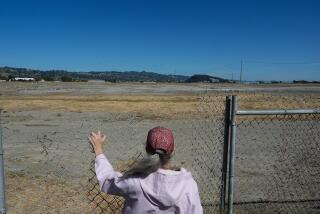Widespread Radiation Hazard Found in Leningrad
- Share via
MOSCOW — A survey of radiation contamination in the Soviet Union’s second-largest city of Leningrad found 150,000 spots where levels were above normal, and a newspaper complained Saturday that officials were slow in telling residents of the danger.
In a report on the Leningrad contamination, the newspaper Komsomolskaya Pravda said the most hazardous areas were initially roped off with signs that said “radioactive,” but later the ropes were removed. A map showing all the areas with high radiation has not been made public, it said.
Specific radiation levels were not given, and it was unclear how many of the nearly 5 million residents of Leningrad were exposed to dangerous radiation.
Most of the radiation is from businesses that use radioactive materials and have no place to dispose of hazardous wastes, the newspaper said.
The report said there is one nuclear disposal site near the city, but that it has limited capacity and cannot handle most commercial waste because of the amount of nuclear power plant waste that must be disposed.
A slow leak also has been discovered at the Sosnovoborskoe disposal site, Komsomolskaya Pravda said, and soil in the area is slowly being contaminated, as is runoff water that ends up in the Gulf of Finland.
Because of the lack of proper disposal facilities, businesses are forced to handle hazardous waste themselves. The newspaper said a medical laboratory studying the effect of radiation on animals simply burned the animals who died from radiation and scattered the ashes around the laboratory’s yard.
In another case, it was discovered that a house was built on the site of a city rubbish heap where radioactive waste had been buried.
The survey by the Radiation Safety Agency found 5.3 million cubic feet of contaminated soil in the city, and Komsomolskaya Pravda said the city has allocated $3.2 million for cleanup--although nobody wants another waste disposal site built in their neighborhood.
More to Read
Sign up for Essential California
The most important California stories and recommendations in your inbox every morning.
You may occasionally receive promotional content from the Los Angeles Times.










